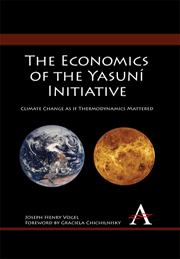Book contents
- Frontmatter
- Contents
- Prologue
- Foreword
- Introduction
- Acknowledgements
- Abbreviations and Acronyms
- The Economics of the Yasuní Initiative
- Chapter 1 Thermodynamics
- Chapter 2 The Tragedy of the Commons
- Chapter 3 The Willful Ignorance of Realpolitik
- Chapter 4 The General Theory of Second Best
- Chapter 5 Through the Bottleneck of a Cowboy Economy
- Conclusions
- Appendix: Annotated YouTube Filmography
- Ordering
- Notes
- Index
Prologue
Published online by Cambridge University Press: 05 March 2012
- Frontmatter
- Contents
- Prologue
- Foreword
- Introduction
- Acknowledgements
- Abbreviations and Acronyms
- The Economics of the Yasuní Initiative
- Chapter 1 Thermodynamics
- Chapter 2 The Tragedy of the Commons
- Chapter 3 The Willful Ignorance of Realpolitik
- Chapter 4 The General Theory of Second Best
- Chapter 5 Through the Bottleneck of a Cowboy Economy
- Conclusions
- Appendix: Annotated YouTube Filmography
- Ordering
- Notes
- Index
Summary
Discussion about climate change and the management of CO2 emissions constitute a global debate for humanity. The causes and effects are the object of intense scientific study by experts who urge immediate and large-scale action. The conversation is largely expressed in terms of economics and development with little contemplation of the ethics of the present predicament.
Until now the proposed solutions have usually relied on the application of market instruments to the scarce capacity of the atmosphere – a global public good – to cycle greenhouse gases. Less discussed are the asymmetries among countries regarding excessive emissions and the consequences suffered. Almost absent is the perspective of political economy.
Into this scenario arrives The Economics of the Yasuní Initiative. It offers a fresh vision, holistic and substantiated, to the dilemmas of climate change. Ethics infuse every page and the tone is defiant. Official discourse is vigorously questioned and thermodynamics is shown to matter, indeed. Physics explains how the atmospheric sink was appropriated in the North and economics, how payment for foregoing petroleum extraction in the South can lead to both efficiency and equity.
The Yasuní-ITT Initiative emerges from Ecuador where the concept of buen vivir (good living) is forging a new relationship for government, society, nature and the market. The proposal finds itself in a milieu unimaginable just a few years ago: the conferring of rights to nature under the Ecuadorian Constitution of November 2008 – an earnest attempt to restore our environment.
- Type
- Chapter
- Information
- The Economics of the Yasuní InitiativeClimate Change as if Thermodynamics Mattered, pp. xi - xiiPublisher: Anthem PressPrint publication year: 2010



